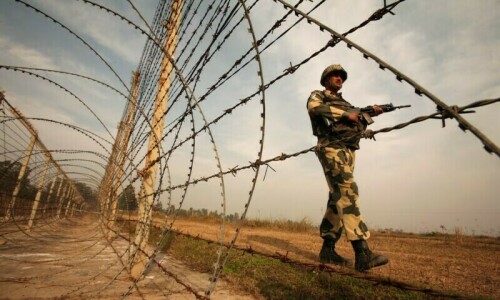The Pakistani rupee’s value declined sharply in the interbank market on Wednesday, with the local currency closing at Rs266.11 per dollar, according to the State Bank of Pakistan (SBP).
This equates to a depreciation of 1.76 per cent from yesterday’s close of Rs261.5 a dollar.
Exchange Companies Association of Pakistan (Ecap) Secretary General Zafar Paracha attributed the rupee’s depreciation to the delay in the agreement with the International Monetary Fund (IMF) for an economic bailout.
“The rupee and the economy are both under pressure again and the main reason is the delay and new conditions by the IMF.”
Director of financial data and analytics portal, Mettis Global, Saad bin Naseer also shared the same view.
“The market was calm in February and [the rupee] appreciated 2.7pc. There was anticipation that an IMF deal would be in soon. However, due to the delay in the IMF agreement and a higher open market rate in Afghanistan — Rs285-290 a dollar — the rupee’s value is declining.”
He said the government should take strict action against those involved in illegal buying and selling of dollars and fulfil the IMF’s conditions as soon as possible to avoid further panic.
“Once the deal is through, you will see the USD fall below the Rs260 level,” he added.
Tresmark’s Head of Strategy Komal Mansoor said there were a number of factors behind the rupee’s depreciation, the most important of which was that negotiations with the IMF have so far not led to a staff-level agreement.
Because of recent rule changes by the State Bank of Pakistan (SBP), exporters were no longer being incentivised to bring proceeds back into the country, which resulted in lower inflows and the rupee falling, she said.
Mansoor added that there were reports the IMF had asked the central bank to reverse the leeway it gave to exporters for realisation of proceeds, which had caused panic in the market. “It does not reflect stability in the policy. If the policies are being dictated by the IMF … of course, there will be panic in the market.”
Another factor that negatively affected the rupee’s value was the prevailing political unrest, she said.
Pakistan is in the midst of a severe economic crisis, with its reserves depleting to just over $3 billion, enough to cover only three weeks of imports. In such a situation, the country urgently needs to sign a deal with the IMF that would not only release $1.2bn but also unlock funding from friendly countries and other multilateral lenders.
A well-placed source had earlier told Dawn that Pakistan and IMF will sign the staff-level agreement on Feb 28. However, background discussions with officials reveal the government is finding it increasingly difficult to convince the Fund to release a loan installment.
The IMF has changed interpretations of at least four prior actions ahead of reaching a staff-level agreement on the direly needed economic bailout.
















































Dear visitor, the comments section is undergoing an overhaul and will return soon.